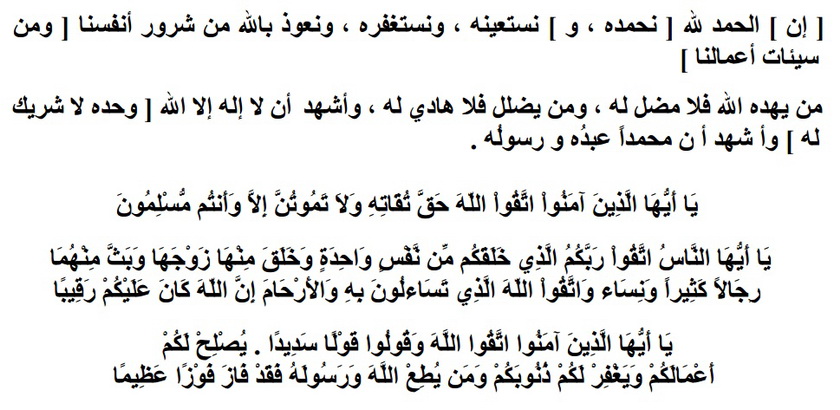In the Name of Allah, Most Merciful, Bestower of Mercy.
Khutbah al-Haajah is the khutbah which you hear the Imaam begin with on Jumu’ah and this is the Khutbah which you hear almost all the scholars begin their books and speeches with.
This sermon was the method employed by the Messenger of Allah (sal Allaahu alayhi wa sallam) to inaugurate his exhortations, lectures and speeches. He (sal Allaahu alayhi wa sallam) would teach it to his Companions (may Allah be pleased with them) in the sum total of their affairs. This is indicative of it’s significance and lofty station.
Regarding this khutbah Shaykh al-Islam Ibn Taymiyyah (rahimahullaah) said in his book Majmoo’ al-Fatawa, Volume 14, page 223:
“Fa hadhihil Khutbah ‘iqdu nidami Islaami wal-Eeman”
Translation: “This Khutbah is a Knot between the Islamic system and Faith”
If we ponder briefly over the contents of this sermon, it becomes apparent with complete clarity, that why it is called so.
For [this sermon] embraces the glorification and the commendation conferred upon the Creator of the Universe. It comprises of the servitude of the slave and his need for his God, and [the Diety] which is to be Worshipped. [In addition to] the servants action of appealing for His Assistance in the sum total of his affairs and matters. This is proceeded by the affirmation of his recognition of the testimony of faith concerning Allah the Exalted, the Majestic, and his Lordship. In addition to the testimony of faith in His Messenger (sal Allaahu alayhi wa sallam) concerning his Messengership.
The hadeeth scholar Shaykh Muhammad Naasir al-Deen al-Albaani (rahimahullaah) wrote an entire treaty on al-Khutbatul Haajah in which he compiled all its isnaads and commented on it.
He (rahimahullaah) said on page 5 of his treaty “Khutbatul Haajah“:
“This is the same khutbah that the pious predecessors would begin their lessons, books and various affairs with.”
The text of the Khutbah
The Transliteration and Translation of the Khutbah
[In]al-hamdu Lillaahi [nahmaduhu wa] nasta’eenahu wa nastaghfiruhu, wa na’oodhu billaahi min shuroori anfusinaa [wa min sayi’aati a’maalinaa]. Man yahdih Illaahu falaa mudilla lahu wa man yudlil falaa haadiya lahu. Wa ashhadu an laa ilaaha ill-Allaah [wahdahu la sharika lahu] wa ashhadu anna Muhammadan ‘abduhu wa rasooluhu
[Verily] all praise is for Allah, we seek His help and His forgiveness. We seek refuge with Allah from the evil of our own souls [and from our bad deeds]. Whomsoever Allah guides will never be led astray, and whomsoever Allah leaves astray, no one can guide. I bear witness that there is no god but Allah, [alone and without any partner] and I bear witness that Muhammad is His slave and Messenger.
“Yaa ayyuha’lladheena aamanu-ttaqu’Llaaha haqqa tuqaatihi wa laa tamootunna illaa wa antum muslimoon” [3:102]
“O you who believe! Fear Allah (by doing all that He has ordered and by abstaining from all that He has forbidden) as He should be feared. [Obey Him, be thankful to Him, and remember Him always], and die not except in a state of Islam (as Muslims) with complete submission to Allah.” [3:102]
“Yaa ayyuha’n-naas uttaqu rabbakum alladhi khalaqakum min nafsin waahidatin wa khalaqa minhaa zawjahaa wa baththa minhumaa rijaalan katheeran wa nisaa’an wa’ttaqu-Llaah alladhi tasaa’aloona bihi wa’l-arhaama inna Allaaha kaana ‘alaykum raqeeban” [4:1]
“O mankind! Be dutiful to your Lord, Who created you from a single person (Adam), and from him (Adam) He created his wife [Hawwa (Eve)], and from them both He created many men and women and fear Allah through Whom you demand your mutual (rights), and (do not cut the relations of) the wombs (kinship). Surely, Allah is Ever an All-Watcher over you.” [4:1]
“Yaa ayyahu’lladheena aamanu-ttaqu’Llaaha wa qooloo qawlan sadeedan. Yuslih Lakum ‘A’maalakum Wa Yaghfir Lakum Dhunoobakum Wa Man Yuti’i Allaaha Wa Rasoolahu Faqad Faaza Fawzaan ‘Azeemaan” [33:70-71]
“O you who believe! Keep your duty to Allah and fear Him, and speak (always) the truth. He will direct you to do righteous good deeds and will forgive you your sins. And whosoever obeys Allah and His Messenger (sal Allaahu alayhi wa sallam) he has indeed achieved a great achievement (i.e. he will be saved from the Hell-fire and made to enter Paradise).” [33:70-71]
[To Proceed]: Then he (sal Allaahu alayhi wa sallam) would mention his necessity.
 navedz.com a muslim's Quest for the truth
navedz.com a muslim's Quest for the truth








